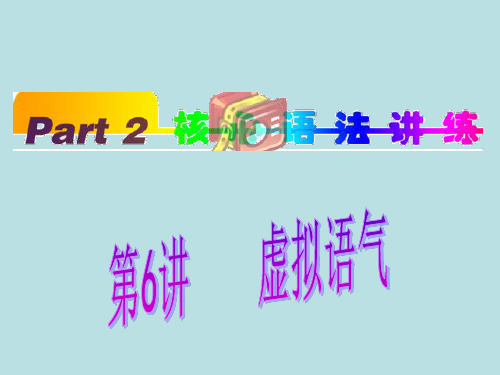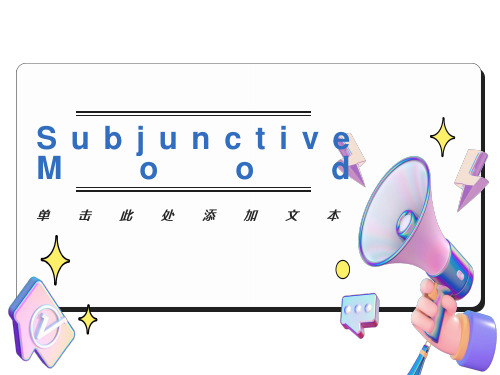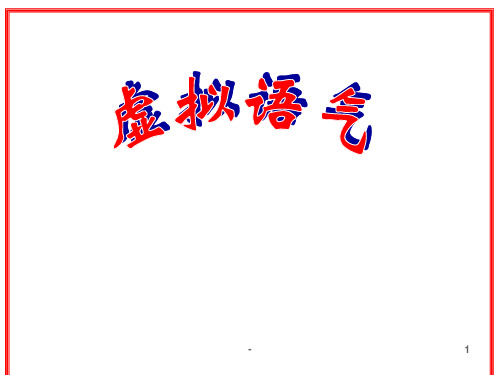虚拟语气课件(经典)
合集下载
虚拟语气公开课全PPT课件

将来虚拟语气
总结词
表示与将来事实相反的情况
详细描述
在从句中使用一般过去时或 “were to+动词原形”,主句中 使用“would+动词原形”,表示 与将来实际情况相反的情况,常 用于表达预测、期望等情感。
混合虚拟语气
总结词
表示与过去、现在或将来事实相反的 情况
详细描述
在从句和主句中分别使用不同的时间 点的虚拟语气形式,表示与过去、现 在或将来实际情况相反的情况,常用 于表达复杂的假设、期望等情感。
在定语从句和主句中的用法
在定语从句和主句中,虚拟语气也有特定的用法。在 定语从句中,虚拟语气通常用于修饰名词或代词,表 达对某种情况的假设或想象。
例如,“I have a dream that one day this nation will rise up and live out the true meaning of its creed: 'We hold these truths to be self-evident: that all men are created equal.'”(我有一个梦想 ,有一天这个国家会站起来并实现其信条的真正含义 :我们认为这些真理是不言而喻的:所有的人生来平 等。)在主句中,虚拟语气通常用于表达对某种情况 的祝愿或假设。
02
在省略句中,虚拟语气通常出现在被省略的部分,表示与实际情况相反的情况 或结果。
03
例如,“If he had known the answer, he would have told you.”这句话省 略了“he had known the answer”的部分,只保留了关键信息“he would have told you”,表示“如果他知道了答案,他会告诉你的”。
虚拟语气公开课全PPT课件

在倒装句中,虚拟语气也可以用来表示假设或条件。例如 ,“Had he not been late, he would have been promoted.”(如果他没迟到,他就被提拔了。)
04
虚拟语气的实际应用
在写作中的应用
写作中,虚拟语气可以用来表达假设 、条件、建议、意愿等,使句子更加 生动、有力。例如,“如果我是你, 我会选择这个选项。”
在翻译中的应用
在翻译过程中,虚拟语气可以用来保持原文的语气和情感色彩,使译文更加准确、传神。例如,在翻 译英文的虚拟语气时,可以将其翻译为中文的“要是”、“如果”、“假如”等词,以保持原文的语 气和含义。
虚拟语气在翻译中还可以用来处理一些难以理解的句子或表达方式,使其更加符合目标语言的习惯和 表达方式。例如,在翻译一些复杂的从句或长句时,可以使用虚拟语气来简化句式或突出重点。
虚拟语气公开课全ppt 课件
汇报人:可编辑
2023-12-23
目录 CONTENT
• 虚拟语气概述 • 虚拟语气的基本形式 • 虚拟语气的特殊形式 • 虚拟语气的实际应用 • 虚拟语气常见错误与纠正方法 • 虚拟语气练习与答案解析
01
虚拟语气概述
定义与特点
定义
虚拟语气是表示假设、想象、推 测等非真实情况的语气,常常用 于条件句、祝愿、建议等语境中 。
虚拟语气常见错误与纠 正方法
时态错误
总结词
时态错误是指虚拟语气在时态使用上的不准确,通常表现为混淆了虚拟语气与陈述语气 。
详细描述
在英语中,虚拟语气通常表示与事实相反的情况,如假设、想象、祝愿等,时态的使用 应与事实相反。例如,在"If I were you, I would do it"中,"were"和"would"构成了 虚拟语气,表示与事实相反的情况。如果混淆了虚拟语气和陈述语气,就会造成时态错
04
虚拟语气的实际应用
在写作中的应用
写作中,虚拟语气可以用来表达假设 、条件、建议、意愿等,使句子更加 生动、有力。例如,“如果我是你, 我会选择这个选项。”
在翻译中的应用
在翻译过程中,虚拟语气可以用来保持原文的语气和情感色彩,使译文更加准确、传神。例如,在翻 译英文的虚拟语气时,可以将其翻译为中文的“要是”、“如果”、“假如”等词,以保持原文的语 气和含义。
虚拟语气在翻译中还可以用来处理一些难以理解的句子或表达方式,使其更加符合目标语言的习惯和 表达方式。例如,在翻译一些复杂的从句或长句时,可以使用虚拟语气来简化句式或突出重点。
虚拟语气公开课全ppt 课件
汇报人:可编辑
2023-12-23
目录 CONTENT
• 虚拟语气概述 • 虚拟语气的基本形式 • 虚拟语气的特殊形式 • 虚拟语气的实际应用 • 虚拟语气常见错误与纠正方法 • 虚拟语气练习与答案解析
01
虚拟语气概述
定义与特点
定义
虚拟语气是表示假设、想象、推 测等非真实情况的语气,常常用 于条件句、祝愿、建议等语境中 。
虚拟语气常见错误与纠 正方法
时态错误
总结词
时态错误是指虚拟语气在时态使用上的不准确,通常表现为混淆了虚拟语气与陈述语气 。
详细描述
在英语中,虚拟语气通常表示与事实相反的情况,如假设、想象、祝愿等,时态的使用 应与事实相反。例如,在"If I were you, I would do it"中,"were"和"would"构成了 虚拟语气,表示与事实相反的情况。如果混淆了虚拟语气和陈述语气,就会造成时态错
虚拟语气(共29张)精品PPT课件

条 件 与 现 从句谓语用一般过去时(be多用were)
在 事 实 相 主句谓语用 would / should / could /
反
might+动词原形
【完成例句】 (3)如果你早点来,你就不会错过那辆公共汽车了。 If you had come earlier, you couldn't / wouldn't have missed the bus. (4)如果他昨天见到了你,他就会还你的书的。 If he had seen you yesterday, he would have returned your book.
【疑难剖析3】if假设条件从句谓语动词发生的时 间与主句所假设的谓语动词不一致,叫做错综条 件虚拟语气。主句和从句的谓语动词要依照假设 的时间而定。
(二)用虚拟语气,从句中谓语时态相应推后(即用 相应的过去时态)的五种句型 【完成例句】 (7)他多么希望自己是只鸟。
How he wishes that he were a bird. (8)我希望昨晚看了那部电影了。
【结论2】
条件与过去 从句谓语用had done 事实相反 主句谓语用would / should / could /
might+have done
【完成例句】 (5)万一明天下雨,运动会就推迟。(事实上明天下 雨的可能性不大。) If it should rain / were to rain / rained tomorrow, the sports meet would be put off. (6)万一杯子掉下来会打碎的。 If you dropped / should drop / were to drop the glass, it would break.
虚拟语气课件(经典)

We are for the advice that the facsthooruyld be
closed down.
1. 表现在 过去时
2. 表过去 过去完成时
3. 表将来 would, might, could+动词原形
1. wish 后面的宾语从句中。 2. 一般用虚拟语气,表示一种不可能实现的愿望。其谓语动词
order, advice, suggestion, proposal, demand, request, desire
It’s suggested that thebpelacnarried out.
My demand is that shhoeuld come me once a week.
to see
②表“坚称,坚持说”,陈述语气,表事实。 ①表“建议”,虚拟, should + do;
②表“表明、暗示” ,用(s陈h述o语ul气d)。practi
1. The teacher suggested that we
______________ more after class. (我们课后多
练习w)as
单击此处添加标题
虚拟语气
虚拟语气
虚拟语气是一种特殊的动词形式,一 是用来表示说话人所说的话不是一个 事实,而是一种假设、猜测、愿望等 (在条件从句中或让步状语从句中);一 是表示说话人的愿望、要求、命令、 建议等 (在宾语从句、主语从句、表语 从句、同位语从句)。
虚拟语气的概念
一、非真实条件句(if等)中的虚拟语气 • 时态一致 2. 错综时间的虚拟句 3. if省略用
4. I wish I were as clever as you
1. If I were a bird, I would fly in the sky.
虚拟语气(经典课件)

与过ห้องสมุดไป่ตู้事实相反
从句用过去完成时,主句用 would/should/could/might+have done。如:If you had come earlier, you would have met him.
与将来事实相反
从句用一般过去时/were to do/should do,主句用 would/should/could/might+动词原形。如:If it rained tomorrow, we would stay at home.
PART 01
虚拟语气概述
定义与特点
01
虚拟语气是一种特殊的动词形式 ,用于表示与实际情况相反的假 设、愿望、建议等。
02
虚拟语气的主要特点是通过改变 动词的形式来传达一种非真实或 假设的语气。
虚拟语气的作用
表达与事实相反的假设
通过虚拟语气,可以表达与现实情况 不符的假设条件,从而探讨可能的结 果或情况。
PART 05
虚拟语气与其他语法的综 合应用
虚拟语气与情态动词的综合应用
情态动词+have done
表示对过去事情的推测,或表达说话人的主观意愿和态度。如:Must have done表示对过去事 情的肯定推测。
情态动词+have been doing
表示对过去正在进行的动作的推测,或表达说话人的某种情绪。如:Should have been working表示本应该一直在工作。
WENKU DESIGN
WENKU DESIGN
2023-2026
ONE
KEEP VIEW
虚拟语气(经典课件)
WENKU DESIGN
WENKU DESIGN
从句用过去完成时,主句用 would/should/could/might+have done。如:If you had come earlier, you would have met him.
与将来事实相反
从句用一般过去时/were to do/should do,主句用 would/should/could/might+动词原形。如:If it rained tomorrow, we would stay at home.
PART 01
虚拟语气概述
定义与特点
01
虚拟语气是一种特殊的动词形式 ,用于表示与实际情况相反的假 设、愿望、建议等。
02
虚拟语气的主要特点是通过改变 动词的形式来传达一种非真实或 假设的语气。
虚拟语气的作用
表达与事实相反的假设
通过虚拟语气,可以表达与现实情况 不符的假设条件,从而探讨可能的结 果或情况。
PART 05
虚拟语气与其他语法的综 合应用
虚拟语气与情态动词的综合应用
情态动词+have done
表示对过去事情的推测,或表达说话人的主观意愿和态度。如:Must have done表示对过去事 情的肯定推测。
情态动词+have been doing
表示对过去正在进行的动作的推测,或表达说话人的某种情绪。如:Should have been working表示本应该一直在工作。
WENKU DESIGN
WENKU DESIGN
2023-2026
ONE
KEEP VIEW
虚拟语气(经典课件)
WENKU DESIGN
WENKU DESIGN
虚拟语气-(共51张)PPT课件

A. Were B. should C. would D. will
-
18
If you had followed my advice, you would be
able to finish the work now. 如果你当时听了我的话,现在就能完成这份 工作了。 (从句说明过去,主句说明现在。)
时 间 If 条件句
主句
过去
现在
将来
-
10
一、一般条件句中的虚拟语气
时 间 If 条件句
主句
过去
had done
would should could might
+have done sth
现在
would
助动词 be用 were should 实义动词 do 用 did could
might
+ do sth
Without your help, we D____ such rapid progress.
A. couldn’t make B. wouldn’t make
C. will not have made D. wouldn’t have made
-
24
名词性从句中的虚拟句
-
25
宾语从句中的虚拟语气
句式一:wish后面宾语从句中的虚拟语气,表示
与事实相反的愿望。其表达形式一般是将从句的谓
语动词退后一个时态。例如:
1)与现在事实相反 : wish + (that)+did(were)
I wish I were as healthy as you.
A.could take B.would take
C.will have taken D.would- have taken
虚拟语气-完整版PPT课件
= Our suggestion is that you (should) be there on time
= It is our suggestion that you (should) be there on time.
= It is suggested that you (should) be there on time.
2.If I had had time, I would have stayed there. Had I had time,
3.If it should rain/If it were to rain tomorrow, I would stay at home. Should it rain tomorrow, Were it to rain tomorrow
3). 错综时间条件句: If you had followed the doctor’s advice, you would feel better now.
条件从句谓语与主句谓语发生时间不一致时,被称为 错综时间条件句。此时主句和从句的谓语动词要依照 假设的时间而定。
If he _h_a_d__s_p_e_n_t(spend) more time practicing speaking English before, he _w_o_u_l_d_b_e____(be) able to speak it better now.
你该离开了。
should do
It’s high time( that )you left.
It’s high time( that) you should leave.
我们该下课了。 It’s time that we had a break. It’s time that we should have a break.
= It is our suggestion that you (should) be there on time.
= It is suggested that you (should) be there on time.
2.If I had had time, I would have stayed there. Had I had time,
3.If it should rain/If it were to rain tomorrow, I would stay at home. Should it rain tomorrow, Were it to rain tomorrow
3). 错综时间条件句: If you had followed the doctor’s advice, you would feel better now.
条件从句谓语与主句谓语发生时间不一致时,被称为 错综时间条件句。此时主句和从句的谓语动词要依照 假设的时间而定。
If he _h_a_d__s_p_e_n_t(spend) more time practicing speaking English before, he _w_o_u_l_d_b_e____(be) able to speak it better now.
你该离开了。
should do
It’s high time( that )you left.
It’s high time( that) you should leave.
我们该下课了。 It’s time that we had a break. It’s time that we should have a break.
虚拟语气用法总结超好ppt课件.ppt
1. if从句中, 省略if,were,had,should可以放在句 认识到了贫困户贫困的根本原因,才能开始对症下药,然后药到病除。近年来国家对扶贫工作高度重视,已经展开了“精准扶贫”项目 首,(用于倒装结构),否定词not不能放在前面。
1.If I were you, I would accept his advice. Were I you,……
It is necessary that_h__e_b_e__s_e_n_t_to__B_e_i_ji_n_g_________. 有必要派他去北京。
认识到了贫困户贫困的根本原因,才 能开始 对症下 药,然 后药到 病除。 近年来 国家对 扶贫工 作高度 重视, 已经展 开了“ 精准扶 贫”项 目
He hesitated for a moment before kicking the ball, otherwise he _____ a goal.
• had scored • scored • would score A.would have scored
认识到了贫困户贫困的根本原因,才 能开始 对症下 药,然 后药到 病除。 近年来 国家对 扶贫工 作高度 重视, 已经展 开了“ 精准扶 贫”项 目
_____________________.
认识到了贫困户贫困的根本原因,才 能开始 对症下 药,然 后药到 病除。 近年来 国家对 扶贫工 作高度 重视, 已经展 开了“ 精准扶 贫”项 目
• It is required that you ____ at six.
• will arrive C. arrived
认识到了贫困户贫困的根本原因,才 能开始 对症下 药,然 后药到 病除。 近年来 国家对 扶贫工 作高度 重视, 已经展 开了“ 精准扶 贫”项 目
虚拟语气公开课全PPT课件
虚拟语气公开课全ppt课件
汇报人:可编辑 2023-12-23
目录
• 虚拟语气简介 • 虚拟语气的种类和形式 • 虚拟语气的时态 • 虚拟语气的用法 • 虚拟语气的特殊情况 • 虚拟语气在写作中的应用
01
虚拟语气简介
什么是虚拟语气
01
虚拟语气是英语语法中的一种表 达方式,用于表示假设、条件、 想象等情境中的动作或状态。
+ 动词原形。
第一人称复数形式
We would/could/might/should
+ 动词原形。
第三人称单数形式
He/She/It would/could/might/should
+ 动词原形。
第三人称复数形式
They would/could/might/should
+ 动词原形。
虚拟语气与陈述语气、祈使语气、疑问语气的比较
虚拟语气在现实生活中的应用
在日常交流中,虚拟语气可以用 于表达委婉的请求、建议或条件
,使语言更加柔和、礼貌。
在商业沟通中,虚拟语气可以用 于表达对客户的尊重、关心或提
供更好的服务。
在文学作品中,虚拟语气可以用 于描绘虚构的场景、情感或人物 心理状态,增强作品的感染力和
表现力。
02
虚拟语气的种类和形式
情态动词表示祝愿、请求、建议等意 义时,其后的从句常用虚拟语气,谓 语动词根据情况可用原形或完成式。
06
虚拟语气在写作中的应用
在议论文中的应用
总结词
增强论述说服力
详细描述
在议论文中使用虚拟语气,可以强调观点和论据,使论述更具说服力。例如, “假如没有教育,社会将停滞不前”,通过使用虚拟语气,强调了教育对社会 发展的重要性。
汇报人:可编辑 2023-12-23
目录
• 虚拟语气简介 • 虚拟语气的种类和形式 • 虚拟语气的时态 • 虚拟语气的用法 • 虚拟语气的特殊情况 • 虚拟语气在写作中的应用
01
虚拟语气简介
什么是虚拟语气
01
虚拟语气是英语语法中的一种表 达方式,用于表示假设、条件、 想象等情境中的动作或状态。
+ 动词原形。
第一人称复数形式
We would/could/might/should
+ 动词原形。
第三人称单数形式
He/She/It would/could/might/should
+ 动词原形。
第三人称复数形式
They would/could/might/should
+ 动词原形。
虚拟语气与陈述语气、祈使语气、疑问语气的比较
虚拟语气在现实生活中的应用
在日常交流中,虚拟语气可以用 于表达委婉的请求、建议或条件
,使语言更加柔和、礼貌。
在商业沟通中,虚拟语气可以用 于表达对客户的尊重、关心或提
供更好的服务。
在文学作品中,虚拟语气可以用 于描绘虚构的场景、情感或人物 心理状态,增强作品的感染力和
表现力。
02
虚拟语气的种类和形式
情态动词表示祝愿、请求、建议等意 义时,其后的从句常用虚拟语气,谓 语动词根据情况可用原形或完成式。
06
虚拟语气在写作中的应用
在议论文中的应用
总结词
增强论述说服力
详细描述
在议论文中使用虚拟语气,可以强调观点和论据,使论述更具说服力。例如, “假如没有教育,社会将停滞不前”,通过使用虚拟语气,强调了教育对社会 发展的重要性。
虚拟语气ppt课件完整版
02 03
例子
Had you come earlier, you would have met him.(= If you had come earlier, you would have met him.)(如果你早点来,你就能 见到他了。)
例子
Should it rain tomorrow, we would stay at home.(= If it should rain tomorrow, we would stay at home.)(如果明天下雨,我们就 呆在家里。)
虚拟语气用于强调句时,通常是通过 “It was ... that”结构对句子中的特 定成分进行强调。
在这种结构中,虚拟语气的使用与普 通虚拟语气略有不同,需要根据具体 情况进行判断。
虚拟语气与其他语法结构搭配使用
虚拟语气可以与定语从句、状语从句等语法结构搭配使用,表达更为复杂的语义关 系。
在这些结构中,虚拟语气的使用需要根据具体的语境和表达的语义关系进行判断。
真实条件句
表达现实中可能实现的情况, 使用陈述语气。
例子
If you study hard, you will pass the exam.(如果你努力 学习,你会通过考试。)
非真实条件句
表达与事实相反或不太可能实 现的情况,使用虚拟语气。
例子
If I were you, I would not do that.(如果我是你,我不会那
状语从句中虚拟语气使用
在if条件状语从句中
如果条件状语从句所表示的内容与实际情况相反或实现的可能性很小,则从句中的谓语动词常用虚拟语气。
在其他状语从句中
除了if条件状语从句外,还有一些其他状语从句也可以用虚拟语气,如:in order that(为了)、so that(以便 )等引导的目的状语从句中。这些从句中的谓语动词形式通常为“may/might/could/should + 动词原形”。
- 1、下载文档前请自行甄别文档内容的完整性,平台不提供额外的编辑、内容补充、找答案等附加服务。
- 2、"仅部分预览"的文档,不可在线预览部分如存在完整性等问题,可反馈申请退款(可完整预览的文档不适用该条件!)。
- 3、如文档侵犯您的权益,请联系客服反馈,我们会尽快为您处理(人工客服工作时间:9:00-18:30)。
They insisted that the boy (should) go with them.
注意:suggest 当表示“暗示、表明“讲时,insist 表示”坚持认为“之意时,应用陈述语气。 The smile on his face suggested that he was satisfied with our work.
My idea is that we (should ) think it over before accepting it.
My suggestion that we (should) have a meeting has been accepted by others.
We all agree to that suggestion that the meeting (should) be put off.
Had you come a few….
4. without, but for,or和otherwise 构成虚拟。 but for要不是,or否则(含蓄条件句)
1.)Without sunlight, there would be no life
on our planet. 2.)But for your help, I wouldn’t have
the train.
3) I wish I were as clever as you
1)If I were a bird, I would fly in the sky.
2)If I had taken your advice ,I wouldn’t have made the mistake.
一、非真实条件句(if等)中的虚拟语气 1.时态一致 2. 错综时间的虚拟句 3. if省略用倒
装句
4.含蓄条件句 5. If only 感叹 二、名词性从句的虚拟语气:
宾语从句、主语从句、表语从句、同位语从句
三、几种特殊的虚拟语气句式
wish、as if/though、would rather、It’s time … It’s necessary/strange/matural/inportant+that从
finished the work.
3.)I was ill that day .otherwise , I would have taken part in the sports meet.(副词)
4.)He telephoned to inform me of your
birthday , or I would have known nothing about it .(连词)
虚拟语气
虚拟语气在 在条件从句中
3、省略 if 的条件从句
当从句中有 were, had 或 should 时,可省略if , 而把它们放在句首。
• If I were to meet him tomorrow, I should ask him about it.
Were I to meet him tomorrow,…
这些动词后面的宾语从句要使用虚拟语气 用法。即从句中的动词 使用should + 动词原 形,或者将should省略。
虚拟语气在:在宾语从句中
注意:insist / suggest 各有两意思,要用不同的语气
insist
① 表“坚决要求”,虚拟, should + do; ②表“坚称,坚持说”,陈述语气,表事实。
PRACTICE 1: Fill in the blanks.
a. If they w__e_r_e (be) here, they _w__o_u_ld__ta_k__e (take) your advice.
b. If the world-war _b_u_r_s_t (burst) out again, what _w__o_u_ld__h_a_p_p_e_n_ (happen) to our people on earth?
主句
If+主语+动词的过去式 (动词be用were)
主语+should,would, might,could+动词 原形
与过去 相反的 假设
If+主语+had +过去分词
主语+should,
would, might, could +have done
与将来 相反的 假设
1、If+主语+动词过去式 2、If+主语+were to+ 动词原形 3、If+主语+should +动词原形
It’s suggested that the plan be carried out.
My demand is that she should come to see me once a week.
We are for the advice that the factory should be
closed down.
• 4)If it rained tomorrow, we would not go shopping.
1. If I had 5000yuan, I would buy a computer. (与现在事实相反)
2. If I were a bird, I would fly in the sky. (与现在事实相反)
主语+should, would might, could+动词
原形
小小顺口溜
虚拟语气并不难, 从句时态都提前, 主句would加在前,注意动词要还原。 (省略if要倒装) e.g.
1)If I were in your shoes, I would accept the terms. 2) If we had left earlier, we wouldn’t have missed
句
1)If I were a bird, I would fly in the sky.
2)If I had taken your advice ,I wouldn’t have made the mistake.
3)If I had been there, it wouldn’t have happened.
偷钱包).
我们建议Tom 去休息一下。 他坚决要求我到场。 国王命令囚犯明天要实施死刑。 他们要求我们派他们去那儿工作。
We suggested that Tom have a rest. He insisted that I (should )be present.
The king ordered that the prisoners be killed the next day.
他脸上的表情表明他对我们的工作很满意.
The man insisted that he had never stolen the money.
那个人坚持说他没有偷钱.
(2)用于表语从句和同位语从句
在suggestion / proposal / order / plan / advice / idea / request 等名词后的表语和同位语从句中要用 “should+动词原形” should可以省略.
二. 名词性从句的虚拟语气。 主要是表示命令、要求、建议的虚拟语气。 1.宾语从句。常见动词: 一个坚持:insist 两个命令:order, command 三个建议:advise, suggest, propose 五个要求:demand , require, request, desire ask
They requested that we (should) send them to work there.
以上动词相应的名词构成的名词性从句 包括主语从句,表语从句和同位语从句也 要使用虚拟语气。从句中的动词形式一样。
即:(should)+V.
order, advice, suggestion, proposal, demand, request, desire
suggest
①表“建议”,虚拟, should + do; ②表“表明、暗示” ,用陈述语气。
1. The teacher suggested that we _(_s_h_o_u__ld__)_p_r_a_c_tise
more after class. (我们课后多练习)
2. The look on her face suggested that she
3. If I had taken your advice, I wouldn’t have made a mistake.
4. If he had been there, it wouldn’t have
happened. (与过去事实相反)
与现在 事实相 反的假 设
一、虚拟语气在条件句中
虚拟条件句
1. If I were you, I would have taken his advice. (从句指现在, 主句指过去)。
2. If I had taken my raincoat with me this morning, I would not be wet now. (从句指过去,主句指现在)。
Subjunctive Mood
We met in this room .
陈述语气
Do come to the
If I were you , I would study hard .
虚拟语气
虚拟语气
虚拟语气的概念
• 虚拟语气是一种特殊的动词形式,一是用 来表示说话人所说的话不是一个事实,而 是一种假设、猜测、愿望等(在条件从句中 或让步状语从句中);一是表示说话人的愿 望、要求、命令、建议等 (在宾语从句、 主语从句、表语从句、同位语从句)。
注意:suggest 当表示“暗示、表明“讲时,insist 表示”坚持认为“之意时,应用陈述语气。 The smile on his face suggested that he was satisfied with our work.
My idea is that we (should ) think it over before accepting it.
My suggestion that we (should) have a meeting has been accepted by others.
We all agree to that suggestion that the meeting (should) be put off.
Had you come a few….
4. without, but for,or和otherwise 构成虚拟。 but for要不是,or否则(含蓄条件句)
1.)Without sunlight, there would be no life
on our planet. 2.)But for your help, I wouldn’t have
the train.
3) I wish I were as clever as you
1)If I were a bird, I would fly in the sky.
2)If I had taken your advice ,I wouldn’t have made the mistake.
一、非真实条件句(if等)中的虚拟语气 1.时态一致 2. 错综时间的虚拟句 3. if省略用倒
装句
4.含蓄条件句 5. If only 感叹 二、名词性从句的虚拟语气:
宾语从句、主语从句、表语从句、同位语从句
三、几种特殊的虚拟语气句式
wish、as if/though、would rather、It’s time … It’s necessary/strange/matural/inportant+that从
finished the work.
3.)I was ill that day .otherwise , I would have taken part in the sports meet.(副词)
4.)He telephoned to inform me of your
birthday , or I would have known nothing about it .(连词)
虚拟语气
虚拟语气在 在条件从句中
3、省略 if 的条件从句
当从句中有 were, had 或 should 时,可省略if , 而把它们放在句首。
• If I were to meet him tomorrow, I should ask him about it.
Were I to meet him tomorrow,…
这些动词后面的宾语从句要使用虚拟语气 用法。即从句中的动词 使用should + 动词原 形,或者将should省略。
虚拟语气在:在宾语从句中
注意:insist / suggest 各有两意思,要用不同的语气
insist
① 表“坚决要求”,虚拟, should + do; ②表“坚称,坚持说”,陈述语气,表事实。
PRACTICE 1: Fill in the blanks.
a. If they w__e_r_e (be) here, they _w__o_u_ld__ta_k__e (take) your advice.
b. If the world-war _b_u_r_s_t (burst) out again, what _w__o_u_ld__h_a_p_p_e_n_ (happen) to our people on earth?
主句
If+主语+动词的过去式 (动词be用were)
主语+should,would, might,could+动词 原形
与过去 相反的 假设
If+主语+had +过去分词
主语+should,
would, might, could +have done
与将来 相反的 假设
1、If+主语+动词过去式 2、If+主语+were to+ 动词原形 3、If+主语+should +动词原形
It’s suggested that the plan be carried out.
My demand is that she should come to see me once a week.
We are for the advice that the factory should be
closed down.
• 4)If it rained tomorrow, we would not go shopping.
1. If I had 5000yuan, I would buy a computer. (与现在事实相反)
2. If I were a bird, I would fly in the sky. (与现在事实相反)
主语+should, would might, could+动词
原形
小小顺口溜
虚拟语气并不难, 从句时态都提前, 主句would加在前,注意动词要还原。 (省略if要倒装) e.g.
1)If I were in your shoes, I would accept the terms. 2) If we had left earlier, we wouldn’t have missed
句
1)If I were a bird, I would fly in the sky.
2)If I had taken your advice ,I wouldn’t have made the mistake.
3)If I had been there, it wouldn’t have happened.
偷钱包).
我们建议Tom 去休息一下。 他坚决要求我到场。 国王命令囚犯明天要实施死刑。 他们要求我们派他们去那儿工作。
We suggested that Tom have a rest. He insisted that I (should )be present.
The king ordered that the prisoners be killed the next day.
他脸上的表情表明他对我们的工作很满意.
The man insisted that he had never stolen the money.
那个人坚持说他没有偷钱.
(2)用于表语从句和同位语从句
在suggestion / proposal / order / plan / advice / idea / request 等名词后的表语和同位语从句中要用 “should+动词原形” should可以省略.
二. 名词性从句的虚拟语气。 主要是表示命令、要求、建议的虚拟语气。 1.宾语从句。常见动词: 一个坚持:insist 两个命令:order, command 三个建议:advise, suggest, propose 五个要求:demand , require, request, desire ask
They requested that we (should) send them to work there.
以上动词相应的名词构成的名词性从句 包括主语从句,表语从句和同位语从句也 要使用虚拟语气。从句中的动词形式一样。
即:(should)+V.
order, advice, suggestion, proposal, demand, request, desire
suggest
①表“建议”,虚拟, should + do; ②表“表明、暗示” ,用陈述语气。
1. The teacher suggested that we _(_s_h_o_u__ld__)_p_r_a_c_tise
more after class. (我们课后多练习)
2. The look on her face suggested that she
3. If I had taken your advice, I wouldn’t have made a mistake.
4. If he had been there, it wouldn’t have
happened. (与过去事实相反)
与现在 事实相 反的假 设
一、虚拟语气在条件句中
虚拟条件句
1. If I were you, I would have taken his advice. (从句指现在, 主句指过去)。
2. If I had taken my raincoat with me this morning, I would not be wet now. (从句指过去,主句指现在)。
Subjunctive Mood
We met in this room .
陈述语气
Do come to the
If I were you , I would study hard .
虚拟语气
虚拟语气
虚拟语气的概念
• 虚拟语气是一种特殊的动词形式,一是用 来表示说话人所说的话不是一个事实,而 是一种假设、猜测、愿望等(在条件从句中 或让步状语从句中);一是表示说话人的愿 望、要求、命令、建议等 (在宾语从句、 主语从句、表语从句、同位语从句)。
